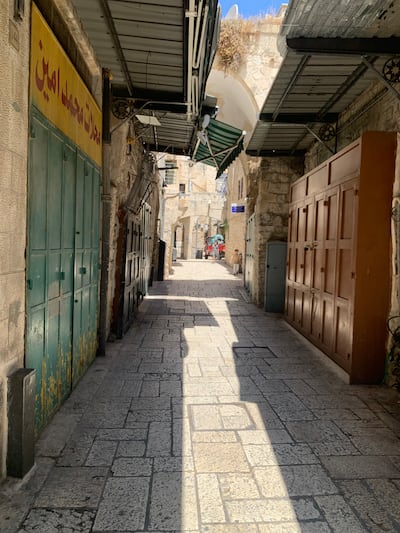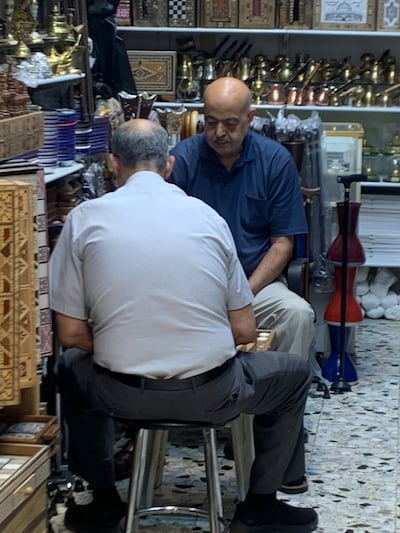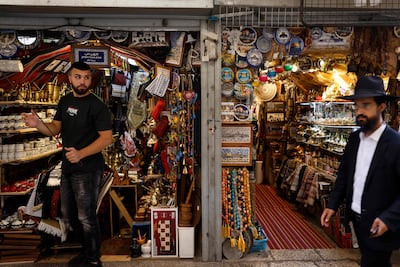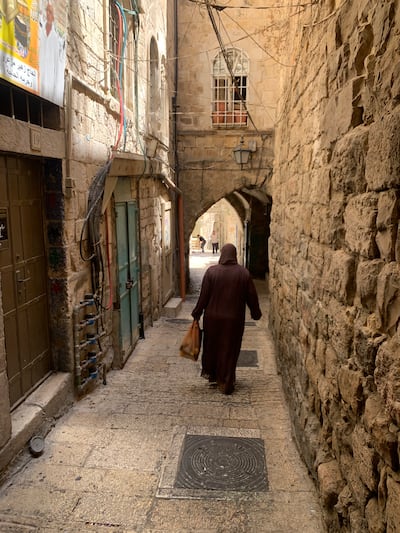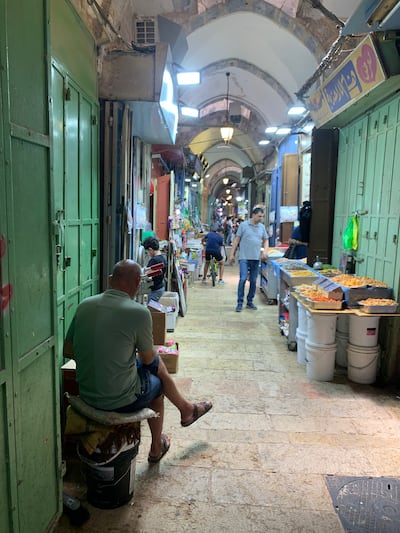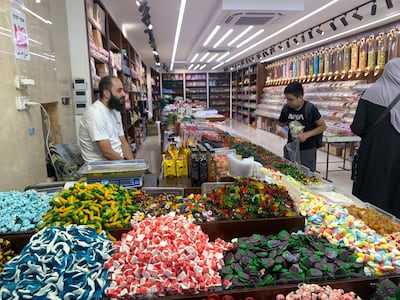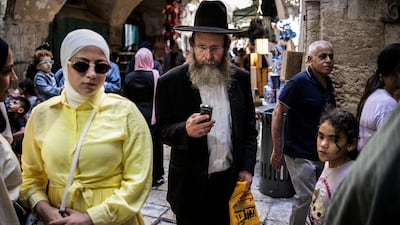The Old City of Jerusalem is perhaps the only place on Earth where you can simultaneously hear the muezzin's call for Muslim prayers and see Jews make their way to the Western Wall while hearing church bells tolling.
These are moments that paint a picture of a place in perfect harmony, somewhere followers of different religions coexist peacefully while sharing a tiny area.
But appearances can be deceptive, and in the case of Jerusalem's Old City, they may well be.
Tension between Jews and Muslims in the Old City is palpable, simmering just beneath the surface in what is perhaps the most contested piece of real estate in the decades-old Arab-Israeli conflict.
"There is no other city in the whole world that's like it. And when I say that, I say it as an academic," said Youssef Al Natsheh, a British-educated Palestinian historian and an expert on Islamic architecture.
"The city is no bigger than one square kilometre that followers of the three Abrahamic religions are competing over while at once revering it and trying to control it. It’s a city that’s on Earth, but its roots are in the high heavens."
The mainly Arab East Jerusalem, which includes the Old City, was captured by Israel in the 1967 Middle East war and annexed in 1980.
In nearly 60 years of Israeli occupation, the Old City's fortunes have frequently shifted, more often for the worse than otherwise. But nothing seen before is as bad as things are now.
The Gaza war, which began in October 2023, has had wide-ranging consequences for the Old City, with Israelis effectively boycotting Arab businesses there. Foreign tourists are staying away, and Israeli police are embracing harsher-than-usual, sometimes brutal, tactics towards Palestinians.
As a result, all shops along several of the Old City's alleys are shuttered. Shopkeepers of those that remain open complain about the scarcity of buyers, with some saying it is not uncommon for an entire day to go by without a single sale.
The disappearance of many of the handicrafts and high-quality goods that the Old City was once famous for has contributed to the slump. For example, olive presses have disappeared, most butchers are gone, along with spice shops. Some of them have been replaced by stores selling cheap clothes or toys. Others turned into souvenir shops, catering to tourists who do not come.
The sight of grim-faced shopkeepers sitting outside their stores smoking or sipping coffee is not uncommon, and is perhaps the most potent evidence of the slump suffered by small businesses in the Old City.
Others spend the day playing backgammon or glued to their mobile phones.
Rigid restrictions placed by Israel on the access of Palestinians to the Old City and Jerusalem as a whole have meant that they do their shopping elsewhere, like nearby Ramallah in the occupied West Bank.
"Business died during the Covid pandemic, bounced back after, and is back to being slow again after the Gaza war broke out," said Gouda Al Hasheem, who owns a shop selling leather products and souvenirs within sight of the Church of the Holy Sepulchre.
"There are days when I don't sell anything, but God is generous! I am too old to leave my business and get a job. The shop is what I know. Besides, what job will I get? The Israelis will likely offer me a cleaning job or find me work as a porter."
Mansour Qawas, 35, has a shop near the Old City's Hebron Gate, an area where Israelis and Jewish tourists are found in relatively large numbers. He is not doing well either.
"Few tourists come since the Gaza war erupted. Things got much worse with the Israel-Iran war in June. It's like the Israelis and foreign Jews, too, are boycotting us," he said as he sipped Turkish coffee from a tiny paper cup.
Besides the souvenirs, Mr Qawas has been trying to capture a slice of the "Jewish market", selling yarmulkes, shofars and menorahs.
The Old City was affected by the first and second Palestinian intifadas in the 1980s and the 2000s. The violence led to a series of draconian security measures by Israel to limit Palestinian access to Jerusalem, thus choking off small businesses in the Old City.
The separation wall built by Israel during the second intifada also cut off some East Jerusalem neighbourhoods from the rest of the city, robbing the Old City's economy of more of its traditional patrons.
A multitude of high taxes is also hurting small businesses, sinking some storekeepers into debt they cannot repay and forcing others to close down.
But after the Hamas-led attack on Israel on October 7, 2023 that left 1,200 dead and triggered the Gaza war, it is the growing distrust between Arabs and Israelis – about 30,000 Palestinians live in the Old City alongside 7,000 Israelis, according to some estimates – that is hurting the Old City the most.
Israelis are rarely seen buying from the Old City's Arab stores or frequenting their eateries. The Israelis who live in the Old City, visit to pray at the Western Wall or shop at Jewish shops, are rarely seen exchanging words or even making eye contact with Palestinians.
That leaves on-duty policemen the only Israelis that Palestinians in the Old City are in regular contact with, and it is only when the latter are asked to show their IDs or where they are headed.
Moreover, security cameras installed by Israeli authorities or Jewish settlers seem to cover every square inch of public space in the Old City, something that Palestinians view as intrusive and are uncomfortable with.
Scores of Israeli policemen are routinely deployed at the Old City's gates and throughout the neighbourhood, frequently stopping Palestinian males to check their IDs or, when outside Al Aqsa mosque - Islam's third holiest shrine - turning them away.
"Since the Gaza war began, the police often ask to see my ID in one spot of the Old City and search me in another. Moreover, I have been denied entry to Al Aqsa mosque several times for no obvious reason," said Abdul Rahman Al Halawany, 32, at his sweets shop in the Old City's Muslim quarter.
"The Jews don’t see me and I don’t see them. Not all Jews hate us, I don't think, but most of them just don’t want to see us here."
Mr Al Natsheh, the historian, added: "After nearly 60 years of occupation, Jewish Israelis and Palestinians in the Old City are unable to find common ground. In the Old City, there is an Arab majority and a Christian minority on one side and a Jewish group on the other," he said at the Old City campus of the Al Quds University as two black-clad, Orthodox Jewish boys pushed the street gate open and looked inquisitively at the courtyard.
To Palestinians, however, the lack of interaction with Israelis is much more than just mutual obliviousness.
Bahaa El Deen, a 37-year-old Palestinian who sells handmade leatherwear and accessories in the Old City, recalled a beating he received from Israeli soldiers enraged by the Hamas attack on Israel in 2023.
"I was not aware of the attack and I opened my store at 7am on October 7, 2023. The soldiers came and beat me up inside my shop. They said opening the shop for business on that day was an insult to Israelis," he recounted as he sat at his shop, a stone's throw away from the heavily guarded entrance to the Western Wall, known in Arabic as Ha'it Al Buraq.
"But, to be honest, as a human being and a father, I cannot be happy about the killing of innocent people. I am unhappy with the killing of women and children in Gaza, but I also don’t wish that to happen to Jewish kids and women," he said.
Mr Bahaa El Deen, who declined to give his last name for fear of Israeli reprisals, makes the sandals, bags and belts that he sells. He shares with his family ownership of the shop and and the tiny, three-storey house above it. He says he occasionally gets generous offers from Israelis who want to buy the house, but he has so far turned them down.
"I can sell my house to the Jews for a really good price if I want to. But I cannot. How can I face my neighbours, my family and people if I do?" he said as scores of smartly dressed Israeli families made their way to the Western Wall on a Saturday afternoon.
How to apply for a drone permit
- Individuals must register on UAE Drone app or website using their UAE Pass
- Add all their personal details, including name, nationality, passport number, Emiratis ID, email and phone number
- Upload the training certificate from a centre accredited by the GCAA
- Submit their request
What are the regulations?
- Fly it within visual line of sight
- Never over populated areas
- Ensure maximum flying height of 400 feet (122 metres) above ground level is not crossed
- Users must avoid flying over restricted areas listed on the UAE Drone app
- Only fly the drone during the day, and never at night
- Should have a live feed of the drone flight
- Drones must weigh 5 kg or less
Squad for first two ODIs
Kohli (c), Rohit, Dhawan, Rayudu, Pandey, Dhoni (wk), Pant, Jadeja, Chahal, Kuldeep, Khaleel, Shami, Thakur, Rahul.
Gulf Under 19s final
Dubai College A 50-12 Dubai College B
White hydrogen: Naturally occurring hydrogen
Chromite: Hard, metallic mineral containing iron oxide and chromium oxide
Ultramafic rocks: Dark-coloured rocks rich in magnesium or iron with very low silica content
Ophiolite: A section of the earth’s crust, which is oceanic in nature that has since been uplifted and exposed on land
Olivine: A commonly occurring magnesium iron silicate mineral that derives its name for its olive-green yellow-green colour
Springsteen: Deliver Me from Nowhere
Director: Scott Cooper
Starring: Jeremy Allen White, Odessa Young, Jeremy Strong
Rating: 4/5
Specs
Engine: Duel electric motors
Power: 659hp
Torque: 1075Nm
On sale: Available for pre-order now
Price: On request
THE SPECS
Aston Martin Rapide AMR
Engine: 6.0-litre V12
Transmission: Touchtronic III eight-speed automatic
Power: 595bhp
Torque: 630Nm
Price: Dh999,563
More on animal trafficking
Groom and Two Brides
Director: Elie Semaan
Starring: Abdullah Boushehri, Laila Abdallah, Lulwa Almulla
Rating: 3/5
What the law says
Micro-retirement is not a recognised concept or employment status under Federal Decree Law No. 33 of 2021 on the Regulation of Labour Relations (as amended) (UAE Labour Law). As such, it reflects a voluntary work-life balance practice, rather than a recognised legal employment category, according to Dilini Loku, senior associate for law firm Gateley Middle East.
“Some companies may offer formal sabbatical policies or career break programmes; however, beyond such arrangements, there is no automatic right or statutory entitlement to extended breaks,” she explains.
“Any leave taken beyond statutory entitlements, such as annual leave, is typically regarded as unpaid leave in accordance with Article 33 of the UAE Labour Law. While employees may legally take unpaid leave, such requests are subject to the employer’s discretion and require approval.”
If an employee resigns to pursue micro-retirement, the employment contract is terminated, and the employer is under no legal obligation to rehire the employee in the future unless specific contractual agreements are in place (such as return-to-work arrangements), which are generally uncommon, Ms Loku adds.
Evacuations to France hit by controversy
- Over 500 Gazans have been evacuated to France since November 2023
- Evacuations were paused after a student already in France posted anti-Semitic content and was subsequently expelled to Qatar
- The Foreign Ministry launched a review to determine how authorities failed to detect the posts before her entry
- Artists and researchers fall under a programme called Pause that began in 2017
- It has benefited more than 700 people from 44 countries, including Syria, Turkey, Iran, and Sudan
- Since the start of the Gaza war, it has also included 45 Gazan beneficiaries
- Unlike students, they are allowed to bring their families to France
Company%C2%A0profile
%3Cp%3E%3Cstrong%3EDate%20started%3A%20%3C%2Fstrong%3EMay%202022%3Cbr%3E%3Cstrong%3EFounder%3A%20%3C%2Fstrong%3EHusam%20Aboul%20Hosn%3Cbr%3E%3Cstrong%3EBased%3A%20%3C%2Fstrong%3EDIFC%3Cbr%3E%3Cstrong%3ESector%3A%20%3C%2Fstrong%3EFinTech%20%E2%80%94%20Innovation%20Hub%3Cbr%3E%3Cstrong%3EEmployees%3A%20%3C%2Fstrong%3Eeight%3Cbr%3E%3Cstrong%3EStage%3A%20%3C%2Fstrong%3Epre-seed%3Cbr%3E%3Cstrong%3EInvestors%3A%20%3C%2Fstrong%3Epre-seed%20funding%20raised%20from%20family%20and%20friends%20earlier%20this%20year%3C%2Fp%3E%0A
HAJJAN
%3Cp%3EDirector%3A%20Abu%20Bakr%20Shawky%C2%A0%3C%2Fp%3E%0A%3Cp%3E%3Cbr%3EStarring%3A%20Omar%20Alatawi%2C%20Tulin%20Essam%2C%20Ibrahim%20Al-Hasawi%C2%A0%3C%2Fp%3E%0A%3Cp%3E%3Cbr%3ERating%3A%204%2F5%3C%2Fp%3E%0A
Skoda Superb Specs
Engine: 2-litre TSI petrol
Power: 190hp
Torque: 320Nm
Price: From Dh147,000
Available: Now
ABU DHABI CARD
5pm: UAE Martyrs Cup (TB) Conditions; Dh90,000; 2,200m
5.30pm: Wathba Stallions Cup (PA) Handicap; Dh70,000; 1,400m
6pm: UAE Matyrs Trophy (PA) Maiden; Dh80,000; 1,600m
6.30pm: Sheikha Fatima bint Mubarak (IFAHR) Apprentice Championship (PA) Prestige; Dh100,000; 1,600m
7pm: Sheikha Fatima bint Mubarak (IFAHR) Ladies World Championship (PA) Prestige; Dh125,000; 1,600m
8pm: Sheikh Zayed bin Sultan Al Nahyan Jewel Crown (PA) Group 1; Dh5,000,000; 1,600m
Stage 5 results
1 Tadej Pogacar (SLO) UAE Team Emirates 3:48:53
2 Alexey Lutsenko (KAZ) Astana Pro Team -
3 Adam Yates (GBR) Mitchelton-Scott -
4 David Gaudu (FRA) Groupama-FDJ 0:00:04
5 Ilnur Zakarin (RUS) CCC Team 0:00:07
General Classification:
1 Adam Yates (GBR) Mitchelton-Scott 20:35:04
2 Tadej Pogacar (SlO) UAE Team Emirates 0:01:01
3 Alexey Lutsenko (KAZ) Astana Pro Team 0:01:33
4 David Gaudu (FRA) Groupama-FDJ 0:01:48
5 Rafał Majka (POL) Bora-Hansgrohe 0:02:11
How it works
Each player begins with one of the great empires of history, from Julius Caesar's Rome to Ramses of Egypt, spread over Europe and the Middle East.
Round by round, the player expands their empire. The more land they have, the more money they can take from their coffers for each go.
As unruled land and soldiers are acquired, players must feed them. When a player comes up against land held by another army, they can choose to battle for supremacy.
A dice-based battle system is used and players can get the edge on their enemy with by deploying a renowned hero on the battlefield.
Players that lose battles and land will find their coffers dwindle and troops go hungry. The end goal? Global domination of course.
GOLF’S RAHMBO
- 5 wins in 22 months as pro
- Three wins in past 10 starts
- 45 pro starts worldwide: 5 wins, 17 top 5s
- Ranked 551th in world on debut, now No 4 (was No 2 earlier this year)
- 5th player in last 30 years to win 3 European Tour and 2 PGA Tour titles before age 24 (Woods, Garcia, McIlroy, Spieth)
How to wear a kandura
Dos
- Wear the right fabric for the right season and occasion
- Always ask for the dress code if you don’t know
- Wear a white kandura, white ghutra / shemagh (headwear) and black shoes for work
- Wear 100 per cent cotton under the kandura as most fabrics are polyester
Don’ts
- Wear hamdania for work, always wear a ghutra and agal
- Buy a kandura only based on how it feels; ask questions about the fabric and understand what you are buying
If you go
Where to stay: Courtyard by Marriott Titusville Kennedy Space Centre has unparalleled views of the Indian River. Alligators can be spotted from hotel room balconies, as can several rocket launch sites. The hotel also boasts cool space-themed decor.
When to go: Florida is best experienced during the winter months, from November to May, before the humidity kicks in.
How to get there: Emirates currently flies from Dubai to Orlando five times a week.
RESULT
Bournemouth 0 Southampton 3 (Djenepo (37', Redmond 45' 1, 59')
Man of the match Nathan Redmond (Southampton)
GIANT REVIEW
Starring: Amir El-Masry, Pierce Brosnan
Director: Athale
Rating: 4/5
Real estate tokenisation project
Dubai launched the pilot phase of its real estate tokenisation project last month.
The initiative focuses on converting real estate assets into digital tokens recorded on blockchain technology and helps in streamlining the process of buying, selling and investing, the Dubai Land Department said.
Dubai’s real estate tokenisation market is projected to reach Dh60 billion ($16.33 billion) by 2033, representing 7 per cent of the emirate’s total property transactions, according to the DLD.
What's in the deal?
Agreement aims to boost trade by £25.5bn a year in the long run, compared with a total of £42.6bn in 2024
India will slash levies on medical devices, machinery, cosmetics, soft drinks and lamb.
India will also cut automotive tariffs to 10% under a quota from over 100% currently.
Indian employees in the UK will receive three years exemption from social security payments
India expects 99% of exports to benefit from zero duty, raising opportunities for textiles, marine products, footwear and jewellery
WHAT IS A BLACK HOLE?
1. Black holes are objects whose gravity is so strong not even light can escape their pull
2. They can be created when massive stars collapse under their own weight
3. Large black holes can also be formed when smaller ones collide and merge
4. The biggest black holes lurk at the centre of many galaxies, including our own
5. Astronomers believe that when the universe was very young, black holes affected how galaxies formed
COMPANY PROFILE
Name: Kumulus Water
Started: 2021
Founders: Iheb Triki and Mohamed Ali Abid
Based: Tunisia
Sector: Water technology
Number of staff: 22
Investment raised: $4 million
All%20The%20Light%20We%20Cannot%20See%20
%3Cp%3E%3Cstrong%3ECreator%3A%20%3C%2Fstrong%3ESteven%20Knight%3C%2Fp%3E%0A%3Cp%3E%3Cstrong%3EStars%3A%C2%A0%3C%2Fstrong%3EMark%20Ruffalo%2C%20Hugh%20Laurie%2C%20Aria%20Mia%20Loberti%3C%2Fp%3E%0A%3Cp%3E%3Cstrong%3ERating%3A%20%3C%2Fstrong%3E1%2F5%C2%A0%3C%2Fp%3E%0A
MATCH DETAILS
Juventus 2 (Bonucci 36, Ronaldo 90 6)
Genoa 1 (Kouame 40)
Jeff Buckley: From Hallelujah To The Last Goodbye
By Dave Lory with Jim Irvin
Know your cyber adversaries
Cryptojacking: Compromises a device or network to mine cryptocurrencies without an organisation's knowledge.
Distributed denial-of-service: Floods systems, servers or networks with information, effectively blocking them.
Man-in-the-middle attack: Intercepts two-way communication to obtain information, spy on participants or alter the outcome.
Malware: Installs itself in a network when a user clicks on a compromised link or email attachment.
Phishing: Aims to secure personal information, such as passwords and credit card numbers.
Ransomware: Encrypts user data, denying access and demands a payment to decrypt it.
Spyware: Collects information without the user's knowledge, which is then passed on to bad actors.
Trojans: Create a backdoor into systems, which becomes a point of entry for an attack.
Viruses: Infect applications in a system and replicate themselves as they go, just like their biological counterparts.
Worms: Send copies of themselves to other users or contacts. They don't attack the system, but they overload it.
Zero-day exploit: Exploits a vulnerability in software before a fix is found.
T20 WORLD CUP QUALIFIERS
Qualifier A, Muscat
(All matches to be streamed live on icc.tv)
Fixtures
Friday, February 18: 10am Oman v Nepal, Canada v Philippines; 2pm Ireland v UAE, Germany v Bahrain
Saturday, February 19: 10am Oman v Canada, Nepal v Philippines; 2pm UAE v Germany, Ireland v Bahrain
Monday, February 21: 10am Ireland v Germany, UAE v Bahrain; 2pm Nepal v Canada, Oman v Philippines
Tuesday, February 22: 2pm Semi-finals
Thursday, February 24: 2pm Final
UAE squad:Ahmed Raza(captain), Muhammad Waseem, Chirag Suri, Vriitya Aravind, Rohan Mustafa, Kashif Daud, Zahoor Khan, Alishan Sharafu, Raja Akifullah, Karthik Meiyappan, Junaid Siddique, Basil Hameed, Zafar Farid, Mohammed Boota, Mohammed Usman, Rahul Bhatia
All about the Sevens
Cape Town Sevens on Saturday and Sunday: Pools A – South Africa, Kenya, France, Russia; B – New Zealand, Australia, Spain, United States; C – England, Scotland, Argentina, Uganda; D – Fiji, Samoa, Canada, Wales
HSBC World Sevens Series standing after first leg in Dubai 1 South Africa; 2 New Zealand; 3 England; 4 Fiji; 5 Australia; 6 Samoa; 7 Kenya; 8 Scotland; 9 France; 10 Spain; 11 Argentina; 12 Canada; 13 Wales; 14 Uganda; 15 United States; 16 Russia
French business
France has organised a delegation of leading businesses to travel to Syria. The group was led by French shipping giant CMA CGM, which struck a 30-year contract in May with the Syrian government to develop and run Latakia port. Also present were water and waste management company Suez, defence multinational Thales, and Ellipse Group, which is currently looking into rehabilitating Syrian hospitals.
